专题02 词汇--2023-2024学年六年级英语上册期末专项复习(译林三起)(含答案)
文档属性
| 名称 | 专题02 词汇--2023-2024学年六年级英语上册期末专项复习(译林三起)(含答案) | 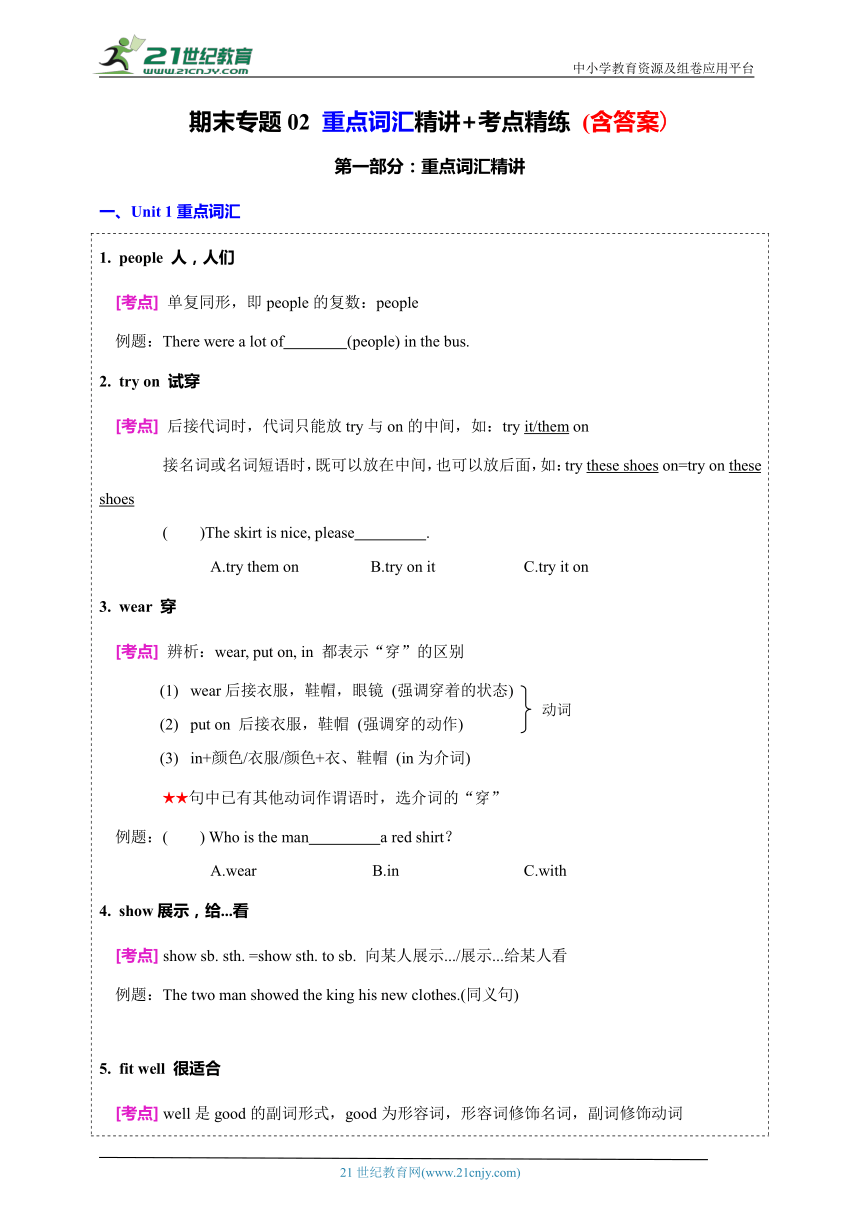 | |
| 格式 | doc | ||
| 文件大小 | 441.9KB | ||
| 资源类型 | 试卷 | ||
| 版本资源 | 牛津译林版 | ||
| 科目 | 英语 | ||
| 更新时间 | 2023-12-12 17:16:59 | ||
图片预览

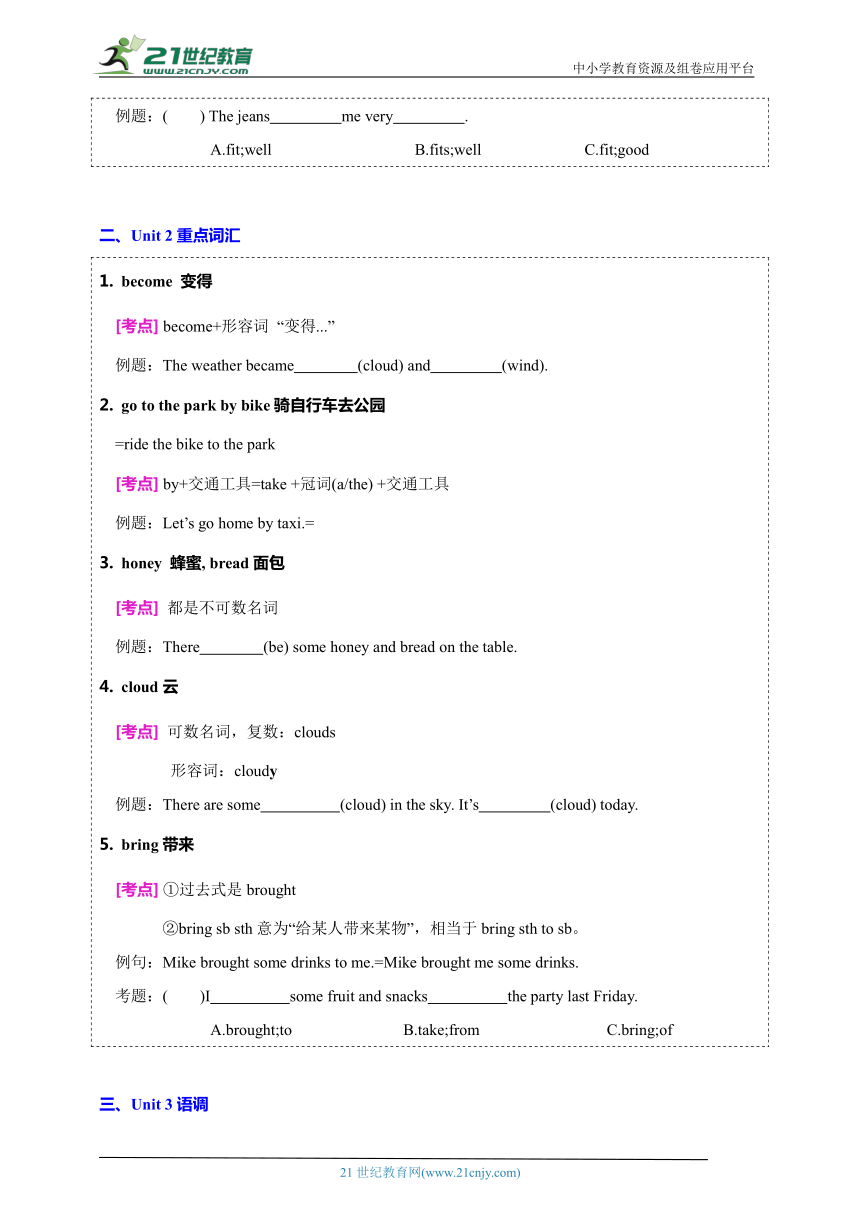
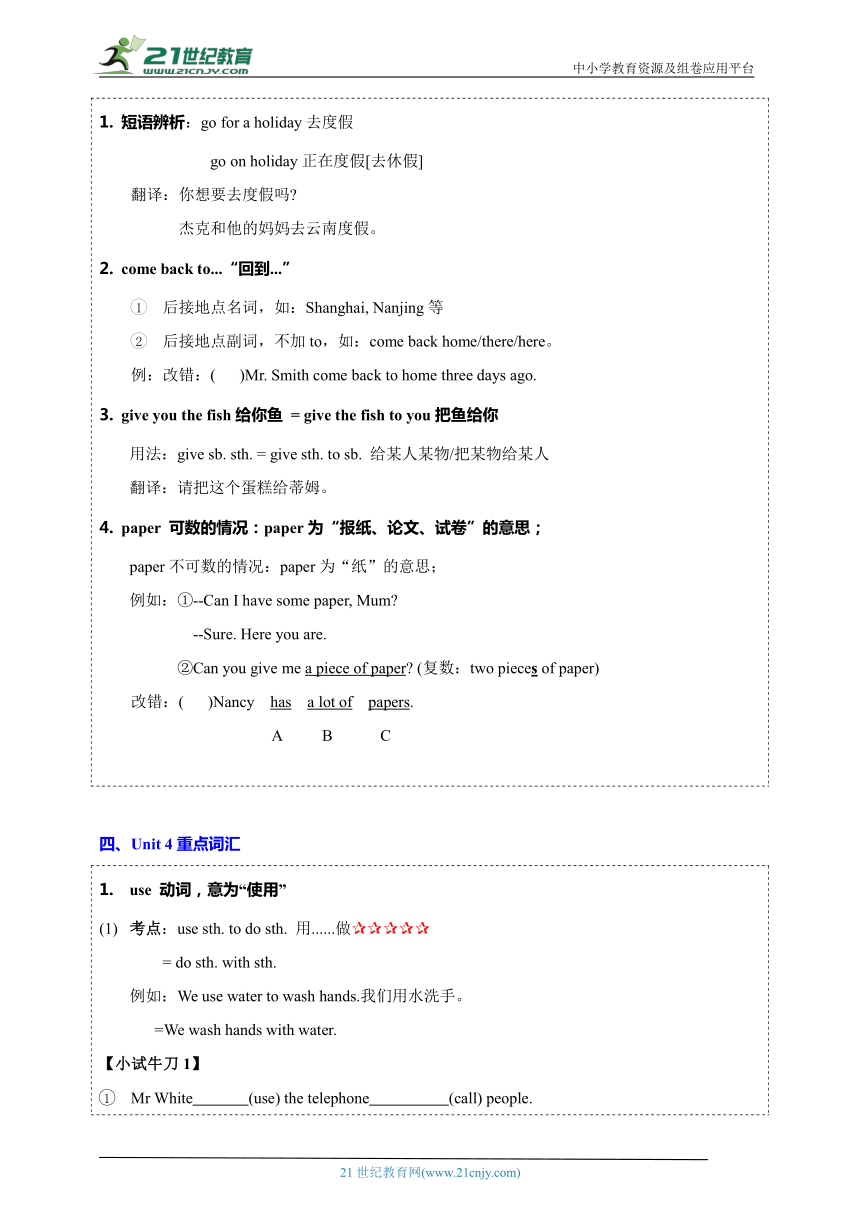
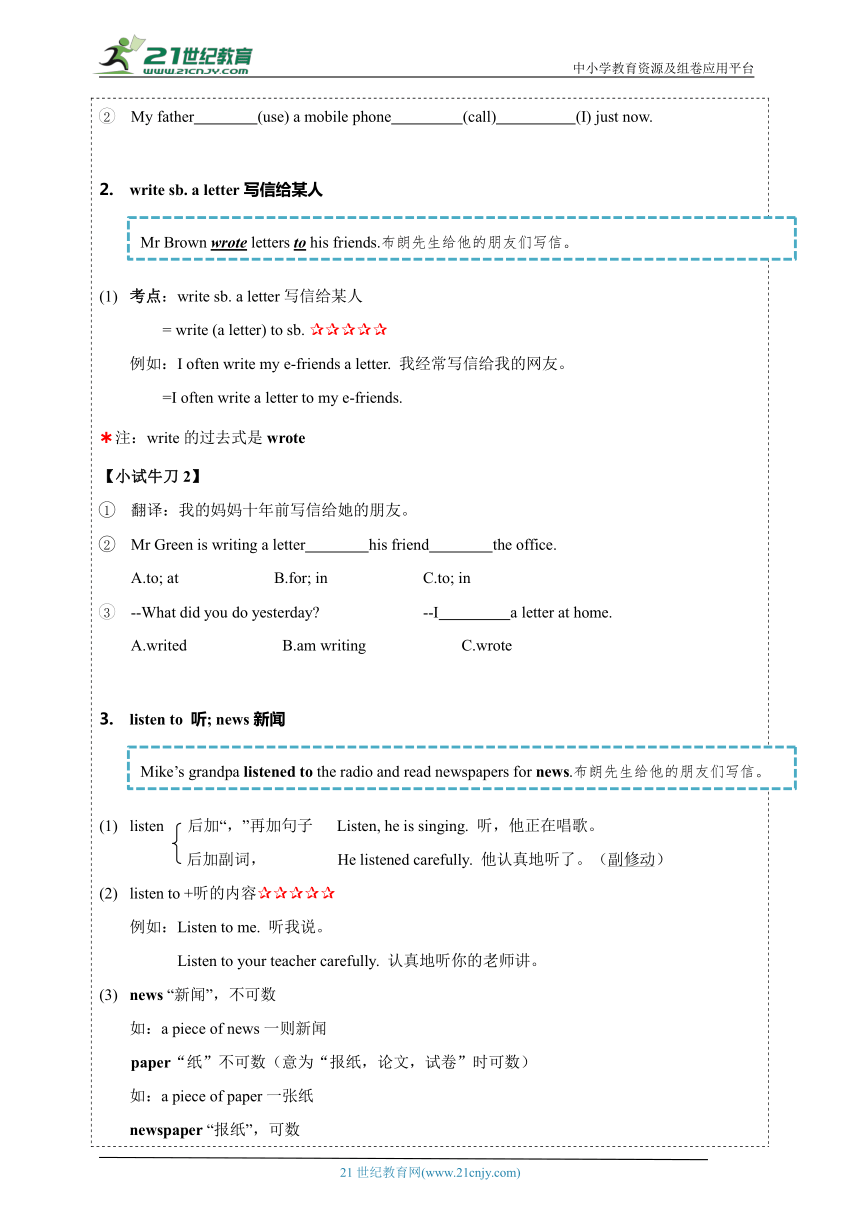
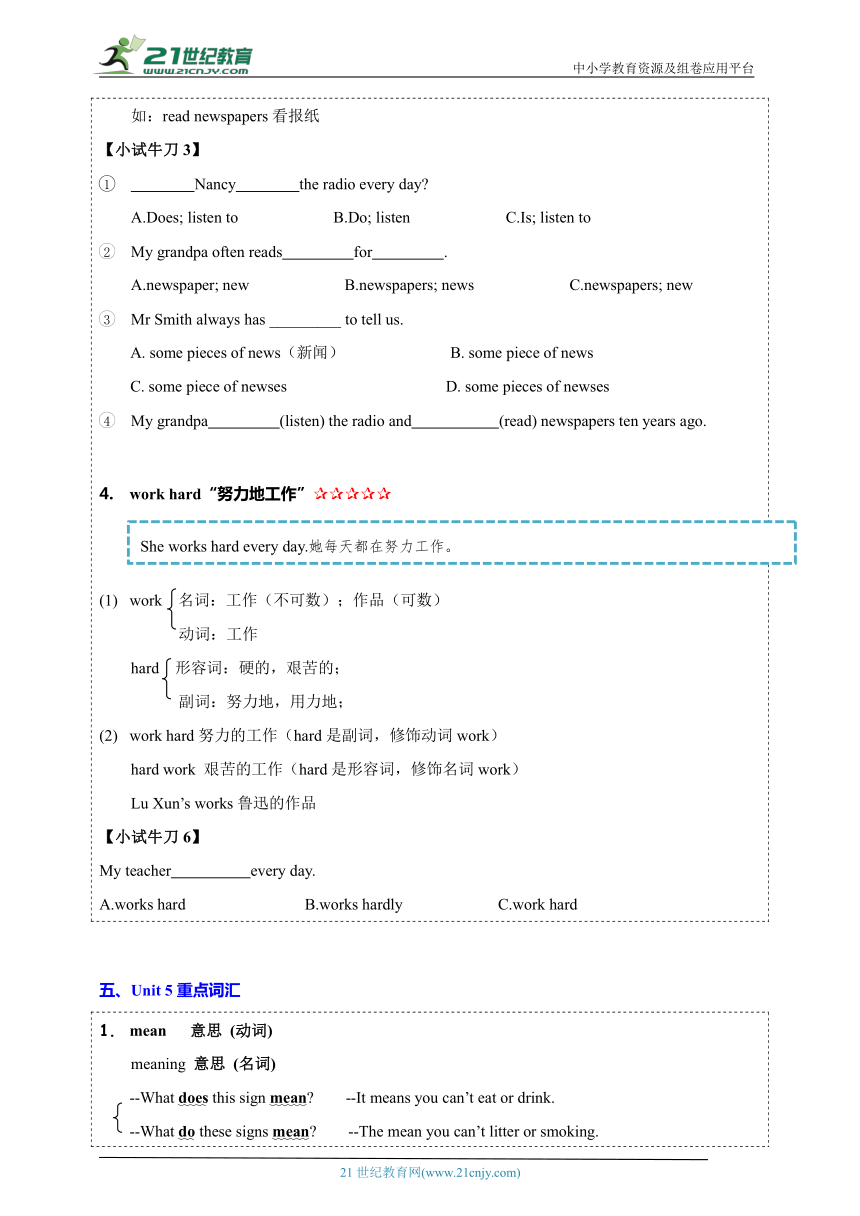
文档简介
中小学教育资源及组卷应用平台
期末专题02 重点词汇精讲+考点精练 (含答案)
第一部分:重点词汇精讲
Unit 1重点词汇
people 人,人们[考点] 单复同形,即people的复数:people 例题:There were a lot of (people) in the bus.try on 试穿 [考点] 后接代词时,代词只能放try与on的中间,如:try it/them on接名词或名词短语时,既可以放在中间,也可以放后面,如:try these shoes on=try on these shoes( )The skirt is nice, please .A.try them on B.try on it C.try it onwear 穿 [考点] 辨析:wear, put on, in 都表示“穿”的区别wear后接衣服,鞋帽,眼镜 (强调穿着的状态)put on 后接衣服,鞋帽 (强调穿的动作)in+颜色/衣服/颜色+衣、鞋帽 (in为介词) ★★句中已有其他动词作谓语时,选介词的“穿” 例题:( ) Who is the man a red shirt?A.wear B.in C.withshow展示,给...看 [考点] show sb. sth. =show sth. to sb. 向某人展示.../展示...给某人看 例题:The two man showed the king his new clothes.(同义句) fit well 很适合 [考点] well是good的副词形式,good为形容词,形容词修饰名词,副词修饰动词例题:( ) The jeans me very .A.fit;well B.fits;well C.fit;good
Unit 2重点词汇
become 变得[考点] become+形容词 “变得...” 例题:The weather became (cloud) and (wind).go to the park by bike骑自行车去公园=ride the bike to the park[考点] by+交通工具=take +冠词(a/the) +交通工具例题:Let’s go home by taxi.= honey 蜂蜜, bread面包[考点] 都是不可数名词 例题:There (be) some honey and bread on the table.cloud云[考点] 可数名词,复数:clouds 形容词:cloudy 例题:There are some (cloud) in the sky. It’s (cloud) today.bring带来[考点] ①过去式是brought②bring sb sth意为“给某人带来某物”,相当于bring sth to sb。例句:Mike brought some drinks to me.=Mike brought me some drinks.考题:( )I some fruit and snacks the party last Friday.A.brought;to B.take;from C.bring;of
Unit 3语调
短语辨析:go for a holiday去度假go on holiday正在度假[去休假]翻译:你想要去度假吗 杰克和他的妈妈去云南度假。 come back to...“回到...”后接地点名词,如:Shanghai, Nanjing等后接地点副词,不加to,如:come back home/there/here。例:改错:( )Mr. Smith come back to home three days ago.give you the fish给你鱼 = give the fish to you把鱼给你用法:give sb. sth. = give sth. to sb. 给某人某物/把某物给某人翻译:请把这个蛋糕给蒂姆。 paper 可数的情况:paper为“报纸、论文、试卷”的意思;paper不可数的情况:paper为“纸”的意思;例如:①--Can I have some paper, Mum --Sure. Here you are.②Can you give me a piece of paper (复数:two pieces of paper) 改错:( )Nancy has a lot of papers. A B C
Unit 4重点词汇
use 动词,意为“使用”考点:use sth. to do sth. 用......做 = do sth. with sth. 例如:We use water to wash hands.我们用水洗手。 =We wash hands with water.【小试牛刀1】Mr White (use) the telephone (call) people.My father (use) a mobile phone (call) (I) just now.write sb. a letter写信给某人考点:write sb. a letter写信给某人= write (a letter) to sb. 例如:I often write my e-friends a letter. 我经常写信给我的网友。=I often write a letter to my e-friends. 注:write的过去式是wrote【小试牛刀2】翻译:我的妈妈十年前写信给她的朋友。 Mr Green is writing a letter his friend the office.A.to; at B.for; in C.to; in--What did you do yesterday --I a letter at home.A.writed B.am writing C.wrotelisten to 听; news新闻 listen 后加“,”再加句子 Listen, he is singing. 听,他正在唱歌。 后加副词, He listened carefully. 他认真地听了。(副修动)listen to +听的内容 例如:Listen to me. 听我说。 Listen to your teacher carefully. 认真地听你的老师讲。news “新闻”,不可数如:a piece of news一则新闻 paper“纸”不可数(意为“报纸,论文,试卷”时可数)如:a piece of paper一张纸newspaper “报纸”,可数 如:read newspapers看报纸【小试牛刀3】 Nancy the radio every day A.Does; listen to B.Do; listen C.Is; listen toMy grandpa often reads for .A.newspaper; new B.newspapers; news C.newspapers; newMr Smith always has _________ to tell us.A. some pieces of news(新闻) B. some piece of news C. some piece of newses D. some pieces of newses My grandpa (listen) the radio and (read) newspapers ten years ago.work hard“努力地工作” work 名词:工作(不可数);作品(可数) 动词:工作hard 形容词:硬的,艰苦的; 副词:努力地,用力地;work hard努力的工作(hard是副词,修饰动词work)hard work 艰苦的工作(hard是形容词,修饰名词work)Lu Xun’s works鲁迅的作品【小试牛刀6】My teacher every day.A.works hard B.works hardly C.work hard
Unit 5重点词汇
mean 意思 (动词) meaning 意思 (名词)--What does this sign mean --It means you can’t eat or drink.--What do these signs mean --The mean you can’t litter or smoking.[典型考题1](1) Look! The sign on the ground (mean) it's very dangerous here.(2) The signs (mean) you can’t shout in the reading room.take...into...把...带进...例如:You shouldn’t take the juice into the shop.[拓展] ① take...with sb.某人随身携带... You should take an umbrella with yourself. 你应该随身携带一把伞。 ② take sb. to sp. 带某人去某地 My father took me to the park yesterday.我爸爸昨天带我去公园了。[典型考题2]( ) She some bread and milk the classroom just now.A. takes; for B. took; into C. take; at D. brings; togive sb. sth. = give sth. to sb. 给某人某物例如:Bobby gave Sam a banana. =Bobby gave a banana to Sam.[典型考题4]( )My mother is giving some food the cat.A. to B. into C. for D. withshould “应该”,是情态动词[考点] ① 后接动词原形 You should (be) careful.② 否定形式:shouldn’t = should not You shouldn’t (smoke) here.[典型考题5]That sign “No ” by the lake means we shouldn't .(swim)
Unit 6重点词汇
rubbish 垃圾rubbish 不可数名词“垃圾” 注意:rubbish作主语时,谓语动词用单数。例如:The rubbish makes the room dirty.【拓展】垃圾词汇分类:rubbish, garbage, trash, litter(了解) rubbish不分类的垃圾(或junk)(生活+厨余垃圾) garbage湿垃圾 trash干垃圾(生活垃圾) litter随便扔在马路边上,没有扔进垃圾桶的垃圾(乱扔在地上的垃圾)[典型考题]Rubbish (make) the street dirty. pick 捡起解析:pick...up “把...捡起” 注意:代词放中间,如:pick it/them up; 名词放中间或后面,如:pick the rubbish up/pick up the rubbish[典型考题]( )The books are on the ground. Please .A.pick them up B.pick up it C.pick it upmove ... away from “从……搬走”解析:move ... away from “从……搬走”move... away意为“把……搬走”例如:(1) Let's move this chair away from the office. 让我们把这把椅子从办公室搬走。(2) Yu Gong wanted to move the two mountains away. 愚公想把那两座山移走。[典型考题]( ) We can move the table the living room.A. away from B. away with C. to away
Unit 7重点词汇
use使用use使用(动词) use sth. to do sth. =do sth. with sth.用...做...useful有用的(形容词) a useful book一本有用的书例如:We use water to wash things every day.我们每天用水洗东西。 =We wash things with water every day.waste 浪费(n./v.)waste time/money + on sth. 浪费时间/金钱干...... (in) doing sth. 例如:You shouldn’t waste time on computer games.你不应该浪费时间在电脑游戏上。 You shouldn’t waste time (in) playing computer games.你不应该浪费时间在打电脑游戏上。coal, oil, energy, glass(玻璃), wood, plastic等表示物质的词,都是不可数名词,其作主语时,谓语动词用单数 例如:Wood comes (come) from trees.木头来自树should应该(情态动词)shouldn’t不应该(情态动词)肯定句:We should save trees.我们应该节约树。否定句:We shouldn’t waste trees.我们不应该浪费树。on the tree/in the tree在树上on the tree指原生物长在树上或把某物附着在树上in the tree指外来物落在树上例如:I can see a lot of apples on the tree.我能看见许多苹果在树上。I found a sign on the tree.我再树上发现了一个标志。too many与too much的用法区别解析:too many + 可数名词复数 too much + 不可数名词拓展:much too +形容词,表示“太...”例如:Don’t use too many plastic bags. Don’t use too much plastic. He is much too fat, he can’t eat too much meat.[典型考题]( )1.Don’t use plastic, Mum.A.too many B.too much C.much too( )2.We shouldn’t drive or use plastic bags.A.too much; too many B.too many; too much C.too much; too much
Unit 8重点词汇
get三单:gets 过去式:got[考点] get sth. from sb. 从某人那里得到某物例如:I got a letter from Lucy this morning. 我今天早上收到了一封来自露西的信。is coming是现在进行时的结构,但在本文中是用现在进行时表示将来时,类似的词还有go/leave等例如:When is Jenny leaving 詹妮什么时候离开? The bus is coming.公共汽车来了。介词at, in, on这三个介词后都可以接时间,但用法有所不同at可以用在具体时刻 at sis o’clock在六点钟in 可以用在月份、季节、年份前,也可用来表示“在上午/下午/晚上”等。 in May在五月 in summer在夏天 in 2020 在2020年 in the evening在晚上on可用在日期、星期、某些节日前 on January 28th 在一月二十八日 on Monday在星期一 on Children’s Day在儿童节
第二部分:考点精练
用所给词的适当形式填空。
1.My sister Cynthia is (wear) a new dress.
2.There (be) too many cars in the street at rush hour yesterday evening.
3.I saw a lot of (people) on People's Square last night.
4.Nancy (show) us some nice pictures yesterday.
5.The foolish cat cried and the mouse (laugh).
6.It (snow) now.We can make a snowman tomorrow.
7.The twins (be) hungry because they didn't have breakfast.
8.I (bring) some mango juice to the party yesterday afternoon.
9.It often in summer here.It two days ago.I like days.(rain)
10.The weather (become) (cloud) and windy last night.
11. (be) there any food and drinks on the table just now
12.The boy (eat) two sausages(香肠) yesterday.
13.-Who (go) to the park by metro -Mike did.
单项选择。
( )1. it often in winter here
A.Is;rain B.Does;rains C.Does;rain
( )2.I don't like the weather.I like sunshine.
A.cloud B.cloudy C.sunny
( )3.Let the rain because we want to play outside.
A.go well B.go away C.go in
( )4. Sunday morning,Miss Li usually goes climbing,but last Sunday she ,because it was snowy and cold.
A.On;didn't B.In;doesn't C.At;didn't
( )5.-It's today.We can't go out to have a picnic. -What a pity!
A.sunny B.cloudy C.rainy
从方框中选择合适的短语,并用其适当形式填空。
walk through become sunny talk aboutbring some bread go to school by bike
1.Miss Li and her students their weekend in the classroom now.
2.After some rainy days,it finally.
3.Yang Ling for breakfast yesterday.
4.The children usually go to school by bus,but they last week.
5.The boy tried the crowd(人群), but he failed(失败).
用所给词的适当形式填空。
1.Tony usually (fly) kites in the park at weekends.
2. you (buy) any new books in the bookshop last week
3.George (play) the violin and (watch) TV last night.
4.Let's (read) the sentence together.
5.Mr Jones often letters many years ago,but now he emails on the Internet.(write)
6.When my mother (be) a student,she (study) very hard.Now she (be) a teacher.She still (work) very hard.
单项选择。
( )1.Mr Green because Tom didn't him in class.
A.gets angry;listened to B.gots angry;listen C.got angry;listen to
( )2.Ten years ago,I eight years old and you ten.
A.was;were B.was;was C.were;are
( )3.The boy skate,but the girl .
A.could;didn't B.could;couldn't C.couldn't;did
( )4.Sam can make a sentence “ago”,but Bobby .
A.for;doesn't B.with;can C.with;can't
( )5.Helen couldn't dance sing five years ago.
A.or B.and C.to
根据中文提示完成句子。
1.现在是下午四点半。我们应该回家了。
It’s in the afternoon now. We go home.
2.墙上的标识的意思是我们不能在这里吸烟。
The sign the we can’t here.
3.刘涛不能在图书馆里乱扔垃圾。
Liu Tao in the library.
4.在超市附近有两家果汁店。
There near the supermarket.
根据所给中文提示,完成下列句子。
1. Bobby and Sam (正在远足) now.
2. The monkey sees a lot of people (在他周围). They (正在看着他).
3. Little Mike (继续走), and he found a sign (在一棵苹果树上).
4. Tom (带来一些面包作为午餐) yesterday.
5. I know (为什么我们不应该在这里大声喊叫).
根据所给首字母或图片提示填空。
1. These s m we can't pick the flowers in the garden.
2. Your grandmother is sleeping. Please don't t here.
3.—Can we take our pets into the j shop —No, you can't.
4. Be c ! The floor is w .
5.—What does it mean —It means you can't here.
6. Is someone here I can smell it.
用所给词的适当形式填空。
1. Your idea (be) great.
2.—Look at (this) pictures of our garden. —They are nice.
3.—Who (make) our streets clean every morning —The cleaners.
4. (keep) the air clean, we can (walk) to school.
5. The fish in the river dead because there a lot of rubbish in it now.(be)
6. Can you find any (bin) in the street
7. There were a lot of (factory) in our city two years ago.
8. Trees help (keep) the air clean.
单项选择。
( )1. We make our school dirty. We keep it clean.
A. shouldn't; should B. should; shouldn't C. should; should
( )2. Please move the rubbish my house.
A. from B. in C. away from
( )3.—What our city dirty
—Smoke cars and factories.
A. makes; to B. make;in C. makes; from
( )4.—What the city messy
—There were so cars in the street.
A. makes; many B. made; many C. made; much
( )5. To keep the air clean, we can plant trees.
A. any B. more C. much
根据所给中文提示,完成下列句子。
1. We should (回收利用并且节约用水).
2. (我们的大部分能源) comes from coal and oil.
3. We should not use (太多塑料).
4. Trees help (保持空气清新).
5. We should not (砍太多树).
根据所给首字母提示填空。
1. After the picnic, remember to take away the dirty bags and o rubbish.
2. Don't w water. You should s it.
3. Don't drink too m cola, Tim. It's bad for your teeth.
4. We can use some w to make a tree house in the forest.
5. Many years ago, the Smiths used c to keep their house warm in winter.
6. Please t these packing bags into the bin.
7. Water is u . Water is life.
8. Paul is collecting(收集)r on the beach.
9. Look! There isn't any o in the bottle.
根据所给首字母或中文提示,完成下列句子。
1. It's going to be Chinese New Year next week. Anna is very e .
2. My parents are going to g me red packets on Chinese New Year’s Day.
3. There is going to be a lion d in front of the cinema in the afternoon.
4. We are going to w lanterns(灯笼) in the park.
5. Su Hai gets an email f her e-friend Anna every week.
6. My family and I (打算吃晚饭) in a French restaurant tomorrow.
7. New Year’s Day (要来了) soon.
8. I'm very (高兴收到) your flowers.
9. Do you know (如何写) an email
10. It's going to be Chinese New Year (下周).
从方框中选择合适的短语,并用其适当形式填空。
red packet watch fireworks buy a new dressChinese New Year's Eve some tangyuan
1. Let’s make for supper. Your father likes them very much.
2. People usually have a big dinner with their family on .
3. I usually get some at Chinese New Year. I use the money to buy some clothes.
4. Jack and Tom are going to tomorrow evening.
5. Helen is going to a party. She wants for it.
单项选择。
( )1. Mr Brown a toy car his son tomorrow.
A. bought; to B. is going to buy;to C. is going to buy;for
( )2. People usually eat at Chinese New Year.
A. moon cakes B. rice dumplings C. tangyuan
( )3.—The New Year is coming. What you on New Year’s Day
—I am going to the bookshop and buy some books there.
A. are; going to do B. did;do C. are; doing
( )4. George often gets an email his friend at Christmas.
A. into B. to C. from
( )5. It is an day, and we are all very .
A. excited; exciting B. exciting; excited C. exciting;exciting
参考答案
l.wearing2.were3.people4.showed 5.laughed 6.is snowing
7. were 8. brought 9. rains,rained, rainy 10. became, cloudy 11. Was 12. ate 13. went
1.C 2.B 3.B 4.A 5.C
1. are talking about 2. became sunny 3. brought some bread
4.went to school by bike 5. to walk through
l.flies2.Did,buy 3.played,watched 4.read 5.wrote,writes 6.was,studied,is,works
1.C 2.A 3.B 4.C 5.A
1. half past four, should 2. on, wall means,smoke 3. can't litter 4. are two juice shops
1.are on an outing 2.around him,are looking at him 3.walked on,on an apple tree
4.brought some bread for lunch 5.why we shouldn't shout here
l.signs,mean2.talk3.juice4.careful,wet 5.litter 6.smoking
1.is 2.these 3.makes 4.To keep,walk 5.are,is 6.bins 7.factories 8.(to)keep
1.A2.C3.C4.B5.B
1. reuse and save water 2. Most of our energy3. too much plastic 4. keep the air clean 5. cut down too many trees
1. other 2. waste, save 3. much 4. wood5. coal 6. throw 7. useful 8. rubbish 9. oil
1. excited 2. give 3. dance 4. watch5. from 6. are going to have dinner 7. is coming 8. happy to get 9. how to write 10. next week
1. some tangyuan 2. Chinese New Year’s Eve3. red packets 4. watch fireworks 5. to buy a new dress
1. C 2. C 3. A 4. C 5. B
动词
Mr Brown wrote letters to his friends.布朗先生给他的朋友们写信。
Mike’s grandpa listened to the radio and read newspapers for news.布朗先生给他的朋友们写信。
She works hard every day.她每天都在努力工作。
Pick it up. 把它捡起来。
We can move some factories away from our city.我们可以把一些工厂从我们的城市搬走。
HYPERLINK "http://21世纪教育网(www.21cnjy.com)
" 21世纪教育网(www.21cnjy.com)
期末专题02 重点词汇精讲+考点精练 (含答案)
第一部分:重点词汇精讲
Unit 1重点词汇
people 人,人们[考点] 单复同形,即people的复数:people 例题:There were a lot of (people) in the bus.try on 试穿 [考点] 后接代词时,代词只能放try与on的中间,如:try it/them on接名词或名词短语时,既可以放在中间,也可以放后面,如:try these shoes on=try on these shoes( )The skirt is nice, please .A.try them on B.try on it C.try it onwear 穿 [考点] 辨析:wear, put on, in 都表示“穿”的区别wear后接衣服,鞋帽,眼镜 (强调穿着的状态)put on 后接衣服,鞋帽 (强调穿的动作)in+颜色/衣服/颜色+衣、鞋帽 (in为介词) ★★句中已有其他动词作谓语时,选介词的“穿” 例题:( ) Who is the man a red shirt?A.wear B.in C.withshow展示,给...看 [考点] show sb. sth. =show sth. to sb. 向某人展示.../展示...给某人看 例题:The two man showed the king his new clothes.(同义句) fit well 很适合 [考点] well是good的副词形式,good为形容词,形容词修饰名词,副词修饰动词例题:( ) The jeans me very .A.fit;well B.fits;well C.fit;good
Unit 2重点词汇
become 变得[考点] become+形容词 “变得...” 例题:The weather became (cloud) and (wind).go to the park by bike骑自行车去公园=ride the bike to the park[考点] by+交通工具=take +冠词(a/the) +交通工具例题:Let’s go home by taxi.= honey 蜂蜜, bread面包[考点] 都是不可数名词 例题:There (be) some honey and bread on the table.cloud云[考点] 可数名词,复数:clouds 形容词:cloudy 例题:There are some (cloud) in the sky. It’s (cloud) today.bring带来[考点] ①过去式是brought②bring sb sth意为“给某人带来某物”,相当于bring sth to sb。例句:Mike brought some drinks to me.=Mike brought me some drinks.考题:( )I some fruit and snacks the party last Friday.A.brought;to B.take;from C.bring;of
Unit 3语调
短语辨析:go for a holiday去度假go on holiday正在度假[去休假]翻译:你想要去度假吗 杰克和他的妈妈去云南度假。 come back to...“回到...”后接地点名词,如:Shanghai, Nanjing等后接地点副词,不加to,如:come back home/there/here。例:改错:( )Mr. Smith come back to home three days ago.give you the fish给你鱼 = give the fish to you把鱼给你用法:give sb. sth. = give sth. to sb. 给某人某物/把某物给某人翻译:请把这个蛋糕给蒂姆。 paper 可数的情况:paper为“报纸、论文、试卷”的意思;paper不可数的情况:paper为“纸”的意思;例如:①--Can I have some paper, Mum --Sure. Here you are.②Can you give me a piece of paper (复数:two pieces of paper) 改错:( )Nancy has a lot of papers. A B C
Unit 4重点词汇
use 动词,意为“使用”考点:use sth. to do sth. 用......做 = do sth. with sth. 例如:We use water to wash hands.我们用水洗手。 =We wash hands with water.【小试牛刀1】Mr White (use) the telephone (call) people.My father (use) a mobile phone (call) (I) just now.write sb. a letter写信给某人考点:write sb. a letter写信给某人= write (a letter) to sb. 例如:I often write my e-friends a letter. 我经常写信给我的网友。=I often write a letter to my e-friends. 注:write的过去式是wrote【小试牛刀2】翻译:我的妈妈十年前写信给她的朋友。 Mr Green is writing a letter his friend the office.A.to; at B.for; in C.to; in--What did you do yesterday --I a letter at home.A.writed B.am writing C.wrotelisten to 听; news新闻 listen 后加“,”再加句子 Listen, he is singing. 听,他正在唱歌。 后加副词, He listened carefully. 他认真地听了。(副修动)listen to +听的内容 例如:Listen to me. 听我说。 Listen to your teacher carefully. 认真地听你的老师讲。news “新闻”,不可数如:a piece of news一则新闻 paper“纸”不可数(意为“报纸,论文,试卷”时可数)如:a piece of paper一张纸newspaper “报纸”,可数 如:read newspapers看报纸【小试牛刀3】 Nancy the radio every day A.Does; listen to B.Do; listen C.Is; listen toMy grandpa often reads for .A.newspaper; new B.newspapers; news C.newspapers; newMr Smith always has _________ to tell us.A. some pieces of news(新闻) B. some piece of news C. some piece of newses D. some pieces of newses My grandpa (listen) the radio and (read) newspapers ten years ago.work hard“努力地工作” work 名词:工作(不可数);作品(可数) 动词:工作hard 形容词:硬的,艰苦的; 副词:努力地,用力地;work hard努力的工作(hard是副词,修饰动词work)hard work 艰苦的工作(hard是形容词,修饰名词work)Lu Xun’s works鲁迅的作品【小试牛刀6】My teacher every day.A.works hard B.works hardly C.work hard
Unit 5重点词汇
mean 意思 (动词) meaning 意思 (名词)--What does this sign mean --It means you can’t eat or drink.--What do these signs mean --The mean you can’t litter or smoking.[典型考题1](1) Look! The sign on the ground (mean) it's very dangerous here.(2) The signs (mean) you can’t shout in the reading room.take...into...把...带进...例如:You shouldn’t take the juice into the shop.[拓展] ① take...with sb.某人随身携带... You should take an umbrella with yourself. 你应该随身携带一把伞。 ② take sb. to sp. 带某人去某地 My father took me to the park yesterday.我爸爸昨天带我去公园了。[典型考题2]( ) She some bread and milk the classroom just now.A. takes; for B. took; into C. take; at D. brings; togive sb. sth. = give sth. to sb. 给某人某物例如:Bobby gave Sam a banana. =Bobby gave a banana to Sam.[典型考题4]( )My mother is giving some food the cat.A. to B. into C. for D. withshould “应该”,是情态动词[考点] ① 后接动词原形 You should (be) careful.② 否定形式:shouldn’t = should not You shouldn’t (smoke) here.[典型考题5]That sign “No ” by the lake means we shouldn't .(swim)
Unit 6重点词汇
rubbish 垃圾rubbish 不可数名词“垃圾” 注意:rubbish作主语时,谓语动词用单数。例如:The rubbish makes the room dirty.【拓展】垃圾词汇分类:rubbish, garbage, trash, litter(了解) rubbish不分类的垃圾(或junk)(生活+厨余垃圾) garbage湿垃圾 trash干垃圾(生活垃圾) litter随便扔在马路边上,没有扔进垃圾桶的垃圾(乱扔在地上的垃圾)[典型考题]Rubbish (make) the street dirty. pick 捡起解析:pick...up “把...捡起” 注意:代词放中间,如:pick it/them up; 名词放中间或后面,如:pick the rubbish up/pick up the rubbish[典型考题]( )The books are on the ground. Please .A.pick them up B.pick up it C.pick it upmove ... away from “从……搬走”解析:move ... away from “从……搬走”move... away意为“把……搬走”例如:(1) Let's move this chair away from the office. 让我们把这把椅子从办公室搬走。(2) Yu Gong wanted to move the two mountains away. 愚公想把那两座山移走。[典型考题]( ) We can move the table the living room.A. away from B. away with C. to away
Unit 7重点词汇
use使用use使用(动词) use sth. to do sth. =do sth. with sth.用...做...useful有用的(形容词) a useful book一本有用的书例如:We use water to wash things every day.我们每天用水洗东西。 =We wash things with water every day.waste 浪费(n./v.)waste time/money + on sth. 浪费时间/金钱干...... (in) doing sth. 例如:You shouldn’t waste time on computer games.你不应该浪费时间在电脑游戏上。 You shouldn’t waste time (in) playing computer games.你不应该浪费时间在打电脑游戏上。coal, oil, energy, glass(玻璃), wood, plastic等表示物质的词,都是不可数名词,其作主语时,谓语动词用单数 例如:Wood comes (come) from trees.木头来自树should应该(情态动词)shouldn’t不应该(情态动词)肯定句:We should save trees.我们应该节约树。否定句:We shouldn’t waste trees.我们不应该浪费树。on the tree/in the tree在树上on the tree指原生物长在树上或把某物附着在树上in the tree指外来物落在树上例如:I can see a lot of apples on the tree.我能看见许多苹果在树上。I found a sign on the tree.我再树上发现了一个标志。too many与too much的用法区别解析:too many + 可数名词复数 too much + 不可数名词拓展:much too +形容词,表示“太...”例如:Don’t use too many plastic bags. Don’t use too much plastic. He is much too fat, he can’t eat too much meat.[典型考题]( )1.Don’t use plastic, Mum.A.too many B.too much C.much too( )2.We shouldn’t drive or use plastic bags.A.too much; too many B.too many; too much C.too much; too much
Unit 8重点词汇
get三单:gets 过去式:got[考点] get sth. from sb. 从某人那里得到某物例如:I got a letter from Lucy this morning. 我今天早上收到了一封来自露西的信。is coming是现在进行时的结构,但在本文中是用现在进行时表示将来时,类似的词还有go/leave等例如:When is Jenny leaving 詹妮什么时候离开? The bus is coming.公共汽车来了。介词at, in, on这三个介词后都可以接时间,但用法有所不同at可以用在具体时刻 at sis o’clock在六点钟in 可以用在月份、季节、年份前,也可用来表示“在上午/下午/晚上”等。 in May在五月 in summer在夏天 in 2020 在2020年 in the evening在晚上on可用在日期、星期、某些节日前 on January 28th 在一月二十八日 on Monday在星期一 on Children’s Day在儿童节
第二部分:考点精练
用所给词的适当形式填空。
1.My sister Cynthia is (wear) a new dress.
2.There (be) too many cars in the street at rush hour yesterday evening.
3.I saw a lot of (people) on People's Square last night.
4.Nancy (show) us some nice pictures yesterday.
5.The foolish cat cried and the mouse (laugh).
6.It (snow) now.We can make a snowman tomorrow.
7.The twins (be) hungry because they didn't have breakfast.
8.I (bring) some mango juice to the party yesterday afternoon.
9.It often in summer here.It two days ago.I like days.(rain)
10.The weather (become) (cloud) and windy last night.
11. (be) there any food and drinks on the table just now
12.The boy (eat) two sausages(香肠) yesterday.
13.-Who (go) to the park by metro -Mike did.
单项选择。
( )1. it often in winter here
A.Is;rain B.Does;rains C.Does;rain
( )2.I don't like the weather.I like sunshine.
A.cloud B.cloudy C.sunny
( )3.Let the rain because we want to play outside.
A.go well B.go away C.go in
( )4. Sunday morning,Miss Li usually goes climbing,but last Sunday she ,because it was snowy and cold.
A.On;didn't B.In;doesn't C.At;didn't
( )5.-It's today.We can't go out to have a picnic. -What a pity!
A.sunny B.cloudy C.rainy
从方框中选择合适的短语,并用其适当形式填空。
walk through become sunny talk aboutbring some bread go to school by bike
1.Miss Li and her students their weekend in the classroom now.
2.After some rainy days,it finally.
3.Yang Ling for breakfast yesterday.
4.The children usually go to school by bus,but they last week.
5.The boy tried the crowd(人群), but he failed(失败).
用所给词的适当形式填空。
1.Tony usually (fly) kites in the park at weekends.
2. you (buy) any new books in the bookshop last week
3.George (play) the violin and (watch) TV last night.
4.Let's (read) the sentence together.
5.Mr Jones often letters many years ago,but now he emails on the Internet.(write)
6.When my mother (be) a student,she (study) very hard.Now she (be) a teacher.She still (work) very hard.
单项选择。
( )1.Mr Green because Tom didn't him in class.
A.gets angry;listened to B.gots angry;listen C.got angry;listen to
( )2.Ten years ago,I eight years old and you ten.
A.was;were B.was;was C.were;are
( )3.The boy skate,but the girl .
A.could;didn't B.could;couldn't C.couldn't;did
( )4.Sam can make a sentence “ago”,but Bobby .
A.for;doesn't B.with;can C.with;can't
( )5.Helen couldn't dance sing five years ago.
A.or B.and C.to
根据中文提示完成句子。
1.现在是下午四点半。我们应该回家了。
It’s in the afternoon now. We go home.
2.墙上的标识的意思是我们不能在这里吸烟。
The sign the we can’t here.
3.刘涛不能在图书馆里乱扔垃圾。
Liu Tao in the library.
4.在超市附近有两家果汁店。
There near the supermarket.
根据所给中文提示,完成下列句子。
1. Bobby and Sam (正在远足) now.
2. The monkey sees a lot of people (在他周围). They (正在看着他).
3. Little Mike (继续走), and he found a sign (在一棵苹果树上).
4. Tom (带来一些面包作为午餐) yesterday.
5. I know (为什么我们不应该在这里大声喊叫).
根据所给首字母或图片提示填空。
1. These s m we can't pick the flowers in the garden.
2. Your grandmother is sleeping. Please don't t here.
3.—Can we take our pets into the j shop —No, you can't.
4. Be c ! The floor is w .
5.—What does it mean —It means you can't here.
6. Is someone here I can smell it.
用所给词的适当形式填空。
1. Your idea (be) great.
2.—Look at (this) pictures of our garden. —They are nice.
3.—Who (make) our streets clean every morning —The cleaners.
4. (keep) the air clean, we can (walk) to school.
5. The fish in the river dead because there a lot of rubbish in it now.(be)
6. Can you find any (bin) in the street
7. There were a lot of (factory) in our city two years ago.
8. Trees help (keep) the air clean.
单项选择。
( )1. We make our school dirty. We keep it clean.
A. shouldn't; should B. should; shouldn't C. should; should
( )2. Please move the rubbish my house.
A. from B. in C. away from
( )3.—What our city dirty
—Smoke cars and factories.
A. makes; to B. make;in C. makes; from
( )4.—What the city messy
—There were so cars in the street.
A. makes; many B. made; many C. made; much
( )5. To keep the air clean, we can plant trees.
A. any B. more C. much
根据所给中文提示,完成下列句子。
1. We should (回收利用并且节约用水).
2. (我们的大部分能源) comes from coal and oil.
3. We should not use (太多塑料).
4. Trees help (保持空气清新).
5. We should not (砍太多树).
根据所给首字母提示填空。
1. After the picnic, remember to take away the dirty bags and o rubbish.
2. Don't w water. You should s it.
3. Don't drink too m cola, Tim. It's bad for your teeth.
4. We can use some w to make a tree house in the forest.
5. Many years ago, the Smiths used c to keep their house warm in winter.
6. Please t these packing bags into the bin.
7. Water is u . Water is life.
8. Paul is collecting(收集)r on the beach.
9. Look! There isn't any o in the bottle.
根据所给首字母或中文提示,完成下列句子。
1. It's going to be Chinese New Year next week. Anna is very e .
2. My parents are going to g me red packets on Chinese New Year’s Day.
3. There is going to be a lion d in front of the cinema in the afternoon.
4. We are going to w lanterns(灯笼) in the park.
5. Su Hai gets an email f her e-friend Anna every week.
6. My family and I (打算吃晚饭) in a French restaurant tomorrow.
7. New Year’s Day (要来了) soon.
8. I'm very (高兴收到) your flowers.
9. Do you know (如何写) an email
10. It's going to be Chinese New Year (下周).
从方框中选择合适的短语,并用其适当形式填空。
red packet watch fireworks buy a new dressChinese New Year's Eve some tangyuan
1. Let’s make for supper. Your father likes them very much.
2. People usually have a big dinner with their family on .
3. I usually get some at Chinese New Year. I use the money to buy some clothes.
4. Jack and Tom are going to tomorrow evening.
5. Helen is going to a party. She wants for it.
单项选择。
( )1. Mr Brown a toy car his son tomorrow.
A. bought; to B. is going to buy;to C. is going to buy;for
( )2. People usually eat at Chinese New Year.
A. moon cakes B. rice dumplings C. tangyuan
( )3.—The New Year is coming. What you on New Year’s Day
—I am going to the bookshop and buy some books there.
A. are; going to do B. did;do C. are; doing
( )4. George often gets an email his friend at Christmas.
A. into B. to C. from
( )5. It is an day, and we are all very .
A. excited; exciting B. exciting; excited C. exciting;exciting
参考答案
l.wearing2.were3.people4.showed 5.laughed 6.is snowing
7. were 8. brought 9. rains,rained, rainy 10. became, cloudy 11. Was 12. ate 13. went
1.C 2.B 3.B 4.A 5.C
1. are talking about 2. became sunny 3. brought some bread
4.went to school by bike 5. to walk through
l.flies2.Did,buy 3.played,watched 4.read 5.wrote,writes 6.was,studied,is,works
1.C 2.A 3.B 4.C 5.A
1. half past four, should 2. on, wall means,smoke 3. can't litter 4. are two juice shops
1.are on an outing 2.around him,are looking at him 3.walked on,on an apple tree
4.brought some bread for lunch 5.why we shouldn't shout here
l.signs,mean2.talk3.juice4.careful,wet 5.litter 6.smoking
1.is 2.these 3.makes 4.To keep,walk 5.are,is 6.bins 7.factories 8.(to)keep
1.A2.C3.C4.B5.B
1. reuse and save water 2. Most of our energy3. too much plastic 4. keep the air clean 5. cut down too many trees
1. other 2. waste, save 3. much 4. wood5. coal 6. throw 7. useful 8. rubbish 9. oil
1. excited 2. give 3. dance 4. watch5. from 6. are going to have dinner 7. is coming 8. happy to get 9. how to write 10. next week
1. some tangyuan 2. Chinese New Year’s Eve3. red packets 4. watch fireworks 5. to buy a new dress
1. C 2. C 3. A 4. C 5. B
动词
Mr Brown wrote letters to his friends.布朗先生给他的朋友们写信。
Mike’s grandpa listened to the radio and read newspapers for news.布朗先生给他的朋友们写信。
She works hard every day.她每天都在努力工作。
Pick it up. 把它捡起来。
We can move some factories away from our city.我们可以把一些工厂从我们的城市搬走。
HYPERLINK "http://21世纪教育网(www.21cnjy.com)
" 21世纪教育网(www.21cnjy.com)
同课章节目录
